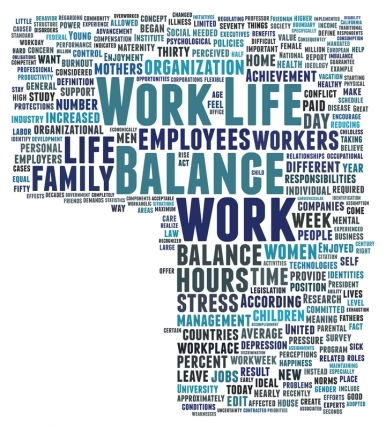 For better or for worse, gone are the days when today’s workforce can leave the office (that is if they even still have a physical office) and be disconnected from their work. As discussed in previous week’s blogs, we are increasing “on” 24/7. We are connected by our smartphones, tablets, and laptops that we seemly carry around with us no matter where we go. It is a blessing and a curse in many ways.
For better or for worse, gone are the days when today’s workforce can leave the office (that is if they even still have a physical office) and be disconnected from their work. As discussed in previous week’s blogs, we are increasing “on” 24/7. We are connected by our smartphones, tablets, and laptops that we seemly carry around with us no matter where we go. It is a blessing and a curse in many ways.
As the use of technology in the workplace has increased, so has the need for employees to adapt new skills and technological skills. The Top Ten Online Colleges released an article outlining the ten most important work skills that will be necessary by 2020. One of the six drivers of the change mentioned in the article points to the emergence of technology and how it is enhancing and extending individual’s abilities. Furthermore, technology has given many employees the ability to work from anywhere. David Weinberger suggested the advancements have created networks that have given individuals the opportunity to contribute meaningfully and eliminated, or at least reduced the hierarchical thinking that ideas only can come from the top. Weinberger went on to mentioned that this new world also provides challenges as networks and the internet provides a plethora of information, some useful and some not. The open access of the internet offers employees the opportunity to research and pull ideas. One of the necessary skills needed by 2020 addressed this challenge by suggesting that sense-making will be a key skill. Having the ability to analysis the information and have a deep understanding of the vital portion of information will be key. This skill is especially difficult as the internet is filled with many claiming to be experts.
Harold Jarche (2013) offered the idea that management will not be necessary as networked workers emerge. Though I do not agree, the point that managers, particularly micro managers, can slow networks is viable. As I discuss last week in my blog, we must all adapt. Managers will need to change their approach as well and find ways to cultivate ideas offered by networked workers. Offering employees the flexibility to complete their jobs in ways other than being in the office 8-5 each day is appreciated and typically an employee expectation.
As technology continues to evolve and changes our work environment, employers will need to find ways to meet the needs of employees to maximize job satisfaction and retention. Telework or telecommuting has become increasing popular. Ann Bednarz offered research both in support of telework as well as information that indicates the negatives associated with the option as she discussed Yahoo’s decision in 2013 to ban telework with the company. Within the article written by Bednarz, the Telework Research Network argued that overall organizational productivity increases when employees are allowed to telework. On the other hand, CareerBuilder.com suggests that teleworkers are less productive and have numerous distractions to contend with. It seems that there are valid arguments on both sides for a host of the issues to consider; however, it seems as though the success of telework or telecommuting depends on both the employee and employer approach. The use of video conferencing, document sharing, social media, and a host of other technologies have allow telecommuting employees a variety of ways to stay networked.
Rob Stanton, a Major in the United States Army, as quoted by Weinberger (2011) said, “In today’s world, it’s not enough to be able to do the job of the person above you. You have to do 18,000 different jobs.” The jobs of today are endlessly changing. The ever-changing world of technology is the main contributor to the evolution positions in the workforce. Aaron Smith (2014) interviewed a numerous leaders from a variety of industries regarding AI, robotics, and technology and the effects on future jobs. Though most agree there will be more jobs created than eliminate, the consensus is that some types of jobs will no longer be needed or will be valued less due to technological advancements. It was mentioned numerous times that it is imperative for the workforce to be trained and educated in such a way that specific skills and knowledge are not the focus, but rather the ability to think critically and creatively as well as have the ability to adapt to evolving situations and environments.
As technology continues to make our lives better by offering of automation to tedious and repetitive tasks, we must not allow technology to get in the way of things that only humans can do. I believe that meaningful relationship building skills are being damaged by our society’s reliance on technology. The article I mentioned regarding the work skills needed in 2020 and the article by Smith, each highlighted the importance of social intelligence or the ability to connect in meaningful ways with others. This is one of the few areas that cannot be replaced by technology.


You bring up the need for workers to be able to make sense out of the onslaught of information yet the difficulty in determining which information is most critical, particularly given how hard it is to parse out which is coming from true experts and which is coming from self-proclaimed experts. I find it increasingly difficult to sort truth from fact but found some guidance from Cathy Caprino writing for Forbes. She mentions real experts focusing on their fields rather than themselves, having no trouble admitting they don’t have an answer, being honest, demonstrating curiosity, sharing appropriately, improvising, and teaching. Anything you would add?
You also mention the expectation many workers now have regarding the ability to work from home and to have flexible work options. Indeed in a 2016 employee benefit study by the Society of Human Resource Management, employees ranked Flexible Work Arrangements as the third most important benefit in terms of job satisfaction, just behind paid time off and medical insurance. Gallup estimates that 37% of U.S. based workers are currently taking advantage of that benefit. Given its popularity and its purported benefits in terms of helping to bring balance to over connected worker’s lives, how do you imagine you would adjust your leadership if you led a team of 10 and half worked in the office and half worked virtually? It seems a reasonable reality and one I don’t feel I am ready to deal with effectively. Look forward to your thoughts. Thanks ~ Tricia
LikeLike
“… She mentions real experts focusing on their fields rather than themselves, having no trouble admitting they don’t have an answer, being honest, demonstrating curiosity, sharing appropriately, improvising, and teaching.” Nice, Tricia. This seems to align with TOO BIG TO KNOW as well. I would add building a trusted network is important, giving you avenues to demonstrate curiosity, share, and question when you do not know.
LikeLike
Tricia,
Good afternoon. Thank you for your comments and questions this week. I appreciate the guidelines you offered from Cathy Caprino. I think I would add the sharing of personal experiences. I think that as she mentioned, focusing on the field before ourselves is important but sharing experiences can be valuable as well. Important to note however, personal experiences are often biased so explaining that it is just one point of view and can offer just a piece of the answer is vital. Questioning information and trying to take the point of view of various sides of the discussion are also worth noting. I particularly enjoyed Caprino’s comment of admitting we do not have the answer sometimes. I have found that this can open conversations in a different way. I have done this several times recently, and it required both the employee and myself to search for answers together. It can be extremely powerful.
In regards to having team members working virtually, I have not worked on a team that has a consistent split of individuals telecommuting. Here is an example of a moment when I would say I do not have the answer! The closest experience I have had has happened recently. I have recently been working with a team member that is not under my umbrella of responsibilities and has her office at one of our off-campus sites. The employee and I are communicating on a daily basis. We have used email, Office 365 OneDrive, and phone calls to keep things moving. Both of us have a hard time walking away from our computers, so it is not uncommon for her and me to be communicating about student interactions outside of normal business hours. In this case, it is easy because both of us have similar philosophies on how to get things done. Having different expectations would make things difficult. If we decided as an institution to have a team that included some in the office and some that worked remotely, I think it would be important for me to find a time that we could all “meet” face-to-face (virtually) once a week or once every other week. I also would work with the team to set up reasonable expectations as to when team members were “on” and what technologies we would use to communicate and share documents for example. Do you have other ideas you think would be important to incorporate?
Jason
LikeLike
Totally agree regarding sharing personal experiences and I think that supports Dr. Watwood’s recommendation of establishing trusted networks. Personal sharing does help build trust as does the vulnerability inherent in admitting you don’t have answers. Sounds like you are fortunate to currently have a good working relationship with your remote colleague. Similar work styles is very helpful. I have had both situations and when the work styles are vastly different very clear expectation setting is needed. And I have found it important for the expectation setting to involve both people – leader and follower. Otherwise non-compliance is too likely. And at times our remote workers are spread among various time zones including Asia so it can be challenging. Using every technology and also making sure to incorporate the human element is critical. And this last is often the most difficult when you may never meet some of these folks face to face. That takes creativity and flexibility.
Wishing you the best in all virtual encounters … Tricia
LikeLike
Nice post. I agree both that technology will create more opportunities, not less, for workers in the future, and that those opportunities will involve our ability to connect as humans.
LikeLike
Dr. Watwood,
Good afternoon. Reflecting on the reading materials this week, I asked our team to think about how we can build relationships by using technology. I have noticed that technology has automated many things for us, which can be a wonderful thing; however, I think in some ways relationship development has suffered. Consumers are typically aware that many of the emails and text messages they receive today are automated and not truly personal. I have asked our team members to think of ways that we can use our current tools to build deeper relationships. I am looking forward to hearing their ideas.
Jason
LikeLike
I enjoyed your post this week and as I reflected on how much technology is a part of our lives, I also questioned if we are using it to its full advantage. I found this article from McKinsey Quarterly (2017) which found that less than 40% of industries are fully digitized (http://www.mckinsey.com/business-functions/digital-mckinsey/our-insights/the-case-for-digital-reinvention?cid=reinventing-eml-alt-mkq-mck-oth-1702). While it seems to be in our face in both personal and professional lives, what it the leader’s role in ensuring that digital resources and training are available? Is that harder to do with teleworkers?
I currently have a team of 11 and a few have flexible/work-from-home schedules. One day when I sent an email to a colleague on her “work from home” day, I received an automated response that she was unavailable and was directed to contact the main office number. That didn’t fit my definition of “work from home”. Finally, how important is it to set boundaries with your followers? And, I agree with your conclusion that managerial oversight is still required.
Best-Krista
LikeLike
Krista,
Thank you for your response and questions. I could not agree more with you regarding the under-utilization of the technologies we have. I think about how I use my smartphone. I use a fraction of its power. Our organizational technologies and tools are no different. I recall a conversation I had with the head of our IT department a few years ago. I was told we used about a twentieth of capabilities of our student database system. I was surprised that many of the things we complained about regarding our student database could be addressed, we just needed to have someone trained to use that portion of the tool. The conversation was a great lesson. I know to ask more questions about what we have access to and may just not have paid for the module, consulting or the training before looking for alternatives.
As for if utilizing technologies is limited for teleworkers, I would answer that it depends. In my personal situation, we would need to look into FERPA rules if we were to allow access to our student database to individuals working from their homes. I think that we could find a reasonable solution but additional security measures would need to be implemented and the institution would need to decide if employees would have access to everything they normally would have if they were on campus. Finally, I think you touched on the need to set expectations for those that would be working at home or off-site. I think having structure is important regardless of whether someone is working in the office or outside of the office. Clear expectations of when everyone is going to be available is reasonable.
Jason
LikeLike
Good afternoon,
Nice post this week. Thank you for sharing it with all of us. As I was reading the section you wrote on telecommuting and how this type of flexibility is now somewhat of an expectation for many workers and professions. Do you have any other ideas about how leaders can create a work environment that is appealing to today’s networked worker, yet still allows for a productive worker? I have long used the approach of not being wedded to the typical work day. I expect my employees to work to their full potential for as long as they feel they can commit each particular day. Some days that it is an eight hour day, but can be 6 or 12 on others. They are expected to complete their tasks, meet their deadlines, and attend meetings where their presence is needed, but generally the hours are of little importance to me. I’d love to hear if you have tried similar techniques to keep talented employees engaged.
Thanks,
The Ayes Have It
LikeLike
You offer some really important points here, Jason. I particularly appreciate your directive that “we must not allow technology to get in the way of things that only humans can do.” Bryan Kramer’s 2015 post (http://www.socialmediatoday.com/technology-data/bryan-kramer/2015-09-15/how-technology-affects-human-relationships) noted that with an internet-connected screen always available or nearby, our attention to and engagement with our immediate world suffers. He lists several areas in which technology may be negatively impacting human relationships before concluding that the best approach is to leverage technology when appropriate…”so that it supplements our relationships rather than replacing them.” This is a simple yet profound shift that I think many would benefit from, of seeing the technology as the means to a greater end, rather than the end itself.
-EA
LikeLike
Jason,
You mention “it is imperative for the workforce to be trained and educated in such a way that specific skills and knowledge are not the focus, but rather the ability to think critically and creatively as well”. I completely agree, however, it seems easier said than done. I think one of the biggest problems is that this sort of training can be very time consuming and expensive, and once completed the employees are more marketable to other employers. Being in the military, we have the benefit of having commitments so certain training is sure to be “recouped” with additional service. Is that something you see happening more with civilian employers or are they just going to take the risk by providing this valuable training?
Chris
LikeLike